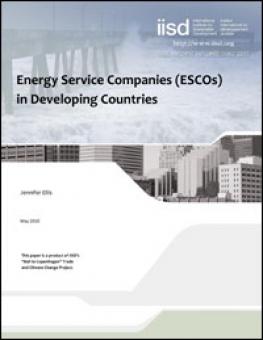
Energy Service Companies (ESCOs) in Developing Countries
Energy Service Companies (ESCOs) provide a promising opportunity to achieve greenhouse gas emissions reductions through increased energy efficiency, particularly in developing countries where the potential gains are often high. The ESCO concept is a straightforward one, whereby ESCO remuneration is based on the amount of energy saved through the project, thereby reducing the risks of undertaking energy-efficiency projects for clients. Large ESCO industries have been successfully operating in most developed countries in North America and Western Europe for many years. Nevertheless, for many years, despite some moderate success stories in countries such as Brazil and South Korea, ESCOs have yet to gain a significant market share in most developing countries.
A large number of programs and mechanisms have been established to help facilitate the growth of ESCOs in developing countries. These include efforts by international agencies, including, most importantly, the World Bank, the European Bank for Reconstruction and Development (EBRD) and the United States Agency for International Development (USAID).
Yet, despite all of the programs and mechanisms to facilitate the growth of ESCOs, they have only experienced moderate success in most developing countries (with the exception of China). This paper surveys the key barriers to ESCO success, and catalogues a suite of recommendations that could help these innovative institutions achieve their full potential in fostering energy efficiency and helping to address climate change.
You might also be interested in
December 2024 | Carbon Minefields Oil and Gas Exploration Monitor
In November 2024, 23 oil and gas exploration licences were awarded across five countries, with Russia granting the licences that account for the largest portion of embodied emissions.
Toward a Coherent, Transformative Approach to Financing Sustainable Development, Climate, and Nature
Four key proposals for the Fourth Financing for Development Conference (FfD4) to create an integrated, equitable approach to financing climate, nature, and development goals.
Green Public Procurement in India
This report analyzes the status of green public procurement (GPP) in India and suggests key strategies for advancing sustainable procurement practices.
Sustainable Asset Valuation (SAVi) of a Small-Scale Tree Planting Initiative in Côte d'Ivoire
This report analyzes the social, economic, and environmental outcomes of a small-scale tree planting initiative at schools in Côte d'Ivoire.